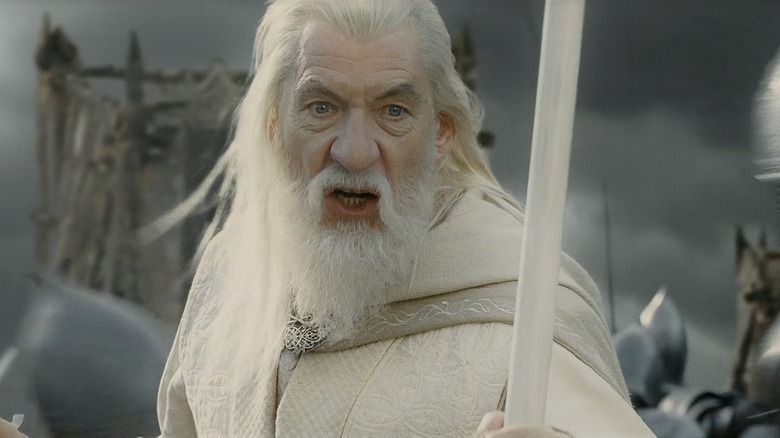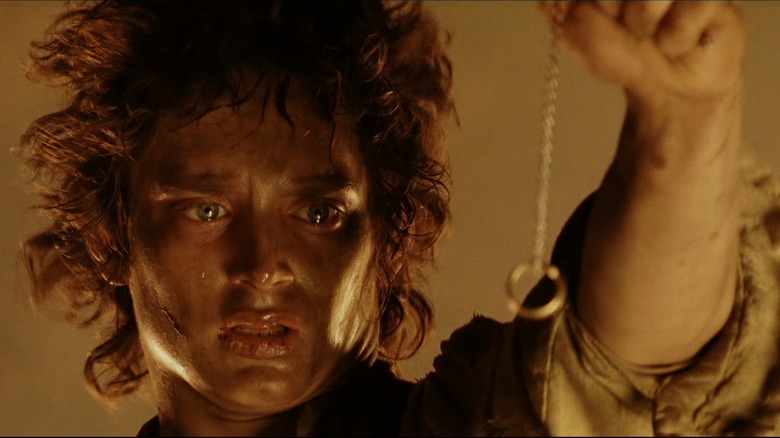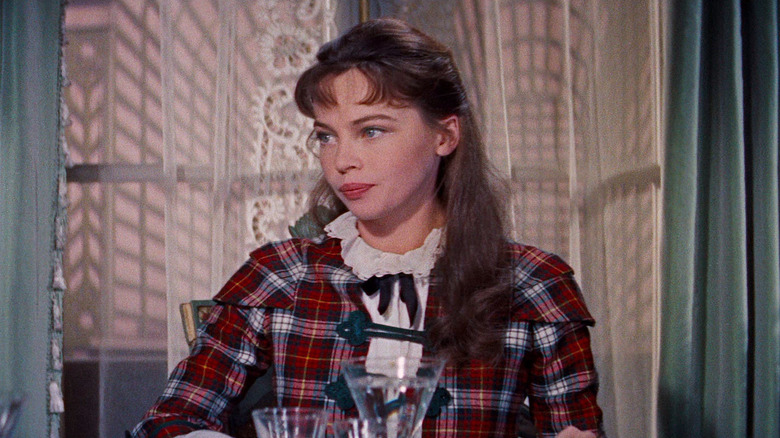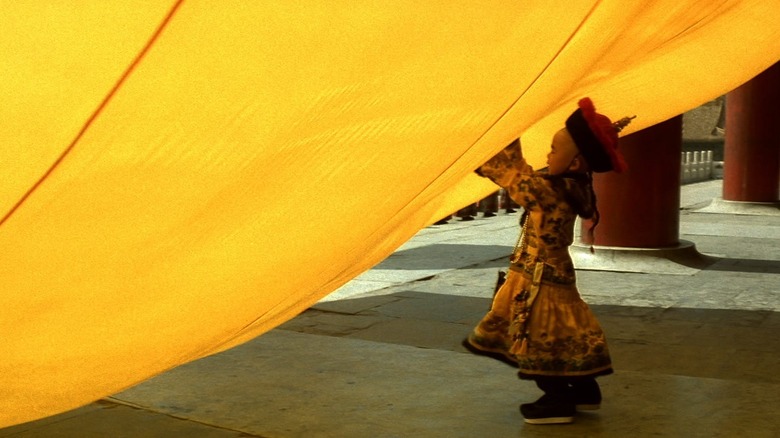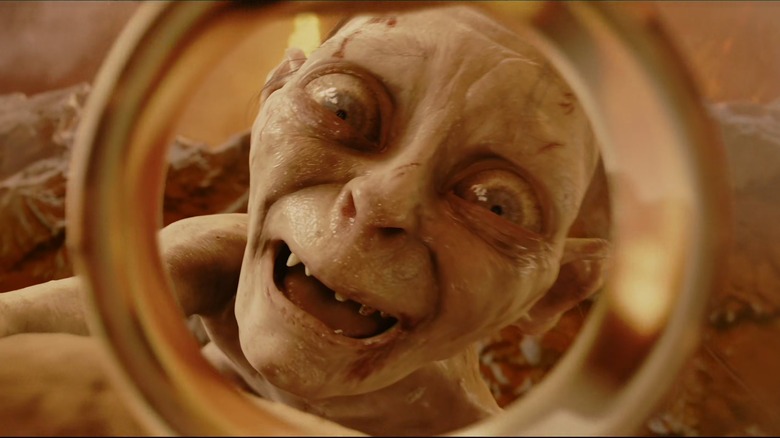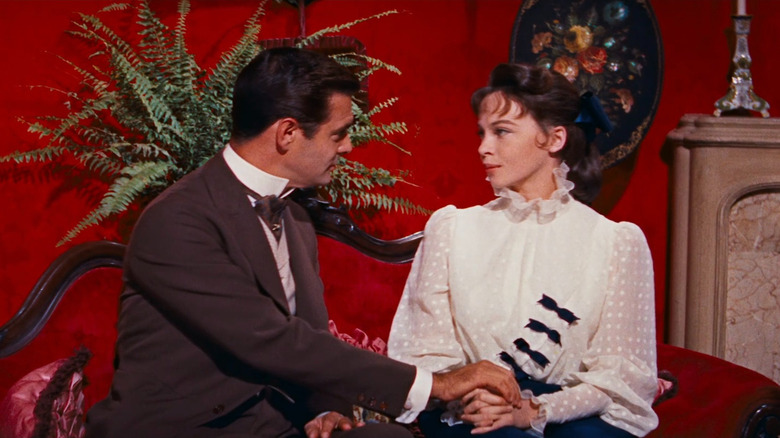Lord Of The Rings, The Last Emperor, And Gigi All Have One Massive Oscar Snub In Common
(Welcome to Did They Get It Right?, a series where we look at an Oscars category from yesteryear and examine whether the Academy's winner stands the test of time.)
Every year, one or several films racks up an impressive haul of nominations. 14 is currently the record, shared amongst "All About Eve," "La La Land," and "Titanic," but routinely, you'll see eight, nine, or double-digit nominations for movies. This past year, "Everything Everywhere All at Once" had 11, while "All Quiet on the Western Front" and "The Banshees of Inisherin" managed nine apiece.
Most of the time, however, the Academy likes to spread the wealth. Take last year's movies. Even with "Everything Everywhere" doing abnormally well, it only won seven of those 11. "All Quiet" just won four, and "Banshees" went home empty-handed. A nomination domination does not necessarily set you up to do a massive clean sweep of the Oscars. Even "Titanic," which not only has a tie for the most nominations for a movie but also the most wins, still couldn't win three of the categories it was nominated in.
In the 95-year history of the Academy, only three movies ever with at least nine nominations have won every single award they were up for: Vincente Minelli's 1958 musical "Gigi," Bernardo Bertolucci's historical epic "The Last Emperor," and Peter Jackson's trilogy-capper "The Lord of the Rings: The Return of the King." The former two went nine-for-nine, and the fantasy threequel went an astounding eleven-for-eleven. To be able to do that well at the Oscars requires a broad cross-section of support, but while they certainly got that support, one branch of the Academy showed resistance every single time. Despite these three films having massive record book sweeps, not one of them received a single acting nomination.
Character vs. spectacle
The reason these movies were able to win so many of the categories they were nominated in is thanks to the below-the-line craft categories like cinematography, editing, costume design, and art direction. Usually, the most awarded film of the evening is able to clean up in those categories, though it may not make it up to those top prizes like Best Picture or Best Director. This is a spot Denis Villeneuve's "Dune" was in two years ago.
These movies can win these awards because they are massive, lavish spectacles fueled by large budgets from Hollywood studios. They present easily identifiable markers of quality for the voters to seize upon. A large-scale musical set in Paris during the Belle Époque, a biopic set in China across the first half of the 20th Century, and a nearly four-hour fantasy war film set in a made-up world are all going to give you ample opportunities to dazzle an audience with inventive, beautiful aesthetic choices.
While audience members are being bowled over by spectacle, oftentimes what gets glossed over at first glance are the characters at the center of that spectacle. People become so impressed with what a movie accomplishes that they almost discount how it makes them feel, which is what actually gets at the heart of what makes a narrative film successful. That always comes from the characters because people connect with other people. You think it's the dresses, the sweeping camera movements, and the swelling score, but they are all working to support the characters. And if the characters aren't engaging, the chances of you wanting to see that film again — let alone declare it the best of a given year — are slim to none. Yet, those characters and performances aren't recognized for their value.
The case of Gigi
Out of all three big sweepers, the lack of acting nominations for "Gigi" stands out to me as the most surprising. This isn't a case where I would nominate cast members from the film in retrospect. In fact, I find "Gigi" to be a dreadfully boring movie. My surprise simply comes from the precursors. At that year's Golden Globes, "Gigi" received four acting nominations: Best Actress in a Musical or Comedy for Leslie Caron, Best Actor for both Louis Jordan and Maurice Chevalier, and Best Supporting Actress for Hermione Gingold, who actually won.
The genre separation at the Globes makes it easier, but that's still a lot of recognition to not transfer over to the Oscars, especially with a win under their belt. Caron, playing the titular character, is a particularly galling omission, and "Gigi" marks the second time she stars in a Best Picture winner that she didn't receive an acting nomination, as the same thing happened with "An American in Paris." If you are to be charmed by "Gigi" at all, it's because of her. And it's not like the Academy doesn't like Caron, as she was nominated for "Lili" in 1954 and "The L-Shaped Room" ten years later.
Louis Jordan I can understand missing out, as he wasn't an Academy favorite, but Chevalier and Gingold were quite surprising. This very year, Chevalier was given an Honorary Oscar. Why not a proper nomination also? Gingold beat out four women who were all nominated for Oscars at the Globes. The big obstacle for the "Gigi" cast was Vincente Minnelli's other film that year, "Some Came Running," scoring nominations in Best Actress, Supporting Actor, Supporting Actress, and more after faring poorly at the Globes after a late release. Sometimes recency can throw everything in the air.
The case of The Last Emperor
The reason for "The Last Emperor" being unable to earn acting nominations is far more troubling than recognizable Hollywood figures being passed over. That reason is, of course, racism. The history of Asian actors at the Academy Awards is truly pitiful. There have been 95 Oscars ceremonies, and only one actor of East Asian descent has ever been nominated for Best Actor, Steven Yeun for "Minari" (he is also the only Asian American to be nominated in that category as well).
"The Last Emperor" features primarily a Chinese and Chinese-American cast, and because of Hollywood's regular biases against recognizing great work from non-white actors and not being overly familiar with the people they see on screen, people like John Lone, who plays Puyi in "The Last Emperor," could be passed over. To shout out the Golden Globes again, which is a shocking thing to do, they did nominate Lone for Best Actor, alongside another actor of color in Denzel Washington for "Cry Freedom." When it came time for the Oscars, the category was entirely white, and the international pick they decided to make was for Marcello Mastroianni for "Dark Eyes." The Globes even nominated Lone two years earlier for "Year of the Dragon" in Best Supporting Actor. If anything, the best shot "The Last Emperor" had at scoring an acting nomination was sadly for Peter O'Toole in Best Supporting Actor, the sole big name star and white actor in the cast. The optics on that would've been truly terrible, though that didn't stop the BAFTAs from doing just that.
It didn't have the same size sweep, but "Parasite" went through this very recently. Heralded picture filled with incredible performances from Asian actors. Zero acting nominations. A true indictment of how the Academy visualizes quality.
The case of The Lord of the Rings
"The Lord of the Rings: The Return of the King" had a lot of advantages when it came to having the biggest sweep in Academy Awards history. This was the third film in a monumental filmmaking achievement with Peter Jackson at the helm, and going 11 for 11 at the Oscars was due in large part to recognizing the "Lord of the Rings" trilogy as a whole, not just "The Return of the King" itself. After all, the previous two installments only won a combined five awards total.
What helped it in all those categories, I think, is what hurt it in the acting categories. This is a cast of characters we are seeing for the third time out, doing variations on what we had already seen before, and while the scale and scope of the films continued to grow, the specialness of the performances could easily dwindle. Very rarely has an actor been nominated for an Oscar for a role they've played previously. Ian McKellen did actually receive a Best Supporting Actor nomination for the first film, "The Fellowship of the Ring," but by "The Return of the King," McKellen as Gandalf was old hat.
Then there's Andy Serkis, who was never nominated for his performance as Gollum. Unfortunately, he was always going to be on the outside looking in because the Academy really has no idea how to judge performance capture. How much of the performance is the actor? How much of the performance comes from the effects artists? Serkis is the preeminent performance capture artist we have, and no matter what he does, he can't score a nomination. Unlike "Gigi" and "The Last Emperor," no one was even expecting acting nominations for "The Return of the King," whether it deserved them or not.
The human factor
When it comes down to who we nominate for acting prizes at the Academy Awards, they tend to fall into a few different boxes. There are the biopic performances where an actor faithfully recreates the likeness, voice, and mannerisms of a famous person. There are character dramas. Some of them are quiet and contemplative. Some of them are boisterous and filled with scenery-chewing. Then sometimes we get the "instant movie star" performance where an actor — usually a young woman — bursts onto the scene with a luminous, eye-grabbing performance that takes them to a new strata of actor in the business. We've spent decades training ourselves to think that this is what good acting is, the kind that should be recognized.
But great acting is in every single kind of movie. Comedy and horror are the two often neglected genres with the most vocal advocates, but great acting extends out to action films, fantasy pictures, lighthearted musicals, and beyond. Plus, great performances can come from anywhere, regardless of age, race, or country of origin. It's not just the same 15 white Hollywood stars year after year.
People adore these movies. You would be hard-pressed to find many people who dislike "The Lord of the Rings: The Return of the King" (though I happen to be one of them). Yes, they are dazzled by the action set pieces, but what makes them cry is the humanity at the core. Just because the performance qualities aren't the sole focus or easily identifiable in these big spectacle movies doesn't mean they aren't there. "Gigi," "The Last Emperor," and "The Return of the King" couldn't be the overwhelming awards successes they were without them.
